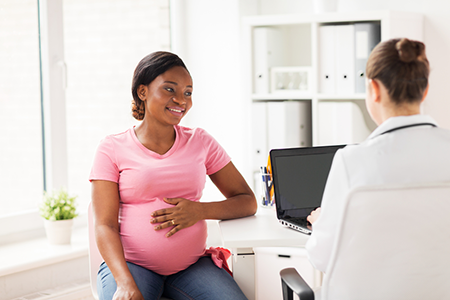
What to expect for prenatal care during the second trimester
In the second trimester of pregnancy, routine prenatal care continues to be essential for both you and your baby. During this trimester—from about 14 to 27 weeks—your baby will continue to grow, and you’ll feel your baby move. Some moms also start to see a reduction in first trimester symptoms like morning sickness or fatigue.
Just like the first trimester, moms-to-be have several tests and checkups during this next stage of pregnancy. Here are a few of the things you can expect during your second trimester prenatal care.
Second trimester prenatal appointments
Most pregnant moms visit their OB GYN for routine checkups every four weeks during the second trimester. In general, you can expect these prenatal exams to be similar. Your OB GYN will:
- Take a urine sample to test for protein or sugar
- Check your blood pressure and weight
- Measure your fundal height—from your pubic bone to the top of your uterus
- Talk with you about tests, screenings, or vaccinations
- Talk with you about any symptoms you may have
If your pregnancy is considered high risk or if you have certain medical conditions, you may see your OB GYN or maternal-fetal medicine specialist more often.
Gestational diabetes screening
In addition to routine checkups, you may have other tests during the second trimester. Typically, your OB GYN will screen you for gestational diabetes toward the end of this trimester. The American Diabetes Association says the condition affects about 10% of pregnancies. But with care and support, you can have a healthy pregnancy and baby.
During the glucose challenge screening, you’ll drink a sugary drink and then have your blood drawn an hour later. Depending on your tests, your OB GYN may have you come back to do another diabetes test, known as the glucose tolerance test.
Genetic testing during the second trimester
You have additional options in the second trimester to screen for, as well as diagnose, conditions your baby may have. The quad screen, also known as the maternal serum screen, is an option around weeks 15 to 20. This test can’t diagnose conditions, but it can detect an increased risk for neural tube defects and chromosomal disorders.
For those who have a high-risk result on a screening test, amniocentesis is also an option during the first part of the second trimester. This procedure uses a needle to obtain a sample of your amniotic fluid. The American College of Obstetricians and Gynecologists says amniocentesis can provide a diagnosis of cystic fibrosis, spina bifida, and Down syndrome.
Ultrasound between 18 and 22 weeks
At around 18 to 22 weeks, most pregnant moms have an ultrasound to check on several aspects of the baby’s health. Sometimes called an anatomy scan, this ultrasound looks at the structure of your baby’s organs, takes measurements, and checks on the placenta and amniotic fluid. And of course, in many cases, you can find out the sex of your baby too.
Some of the areas your ultrasound will evaluate include:
- Heart
- Brain and spine
- Face
- Abdomen
- Kidneys and bladder
- Umbilical cord
- Placenta
After your ultrasound, your OB GYN will let you know if there are any areas of concern or if any additional testing is needed.
When to call your OB GYN
While it’s common to have different symptoms during the second trimester than the first, it’s important to listen to your body. The U.S. National Library of Medicine says to watch for these potential warning signs:
- Any vaginal bleeding or vaginal discharge with odor
- Moderate or severe cramping
- Fever or chills
- Pain with passing urine or other signs of a UTI
- Any other concerns about your pregnancy
If something doesn’t feel right or you notice a symptom that isn’t normal, call your OB GYN. He or she can check on your health and guide you to the care you need.
